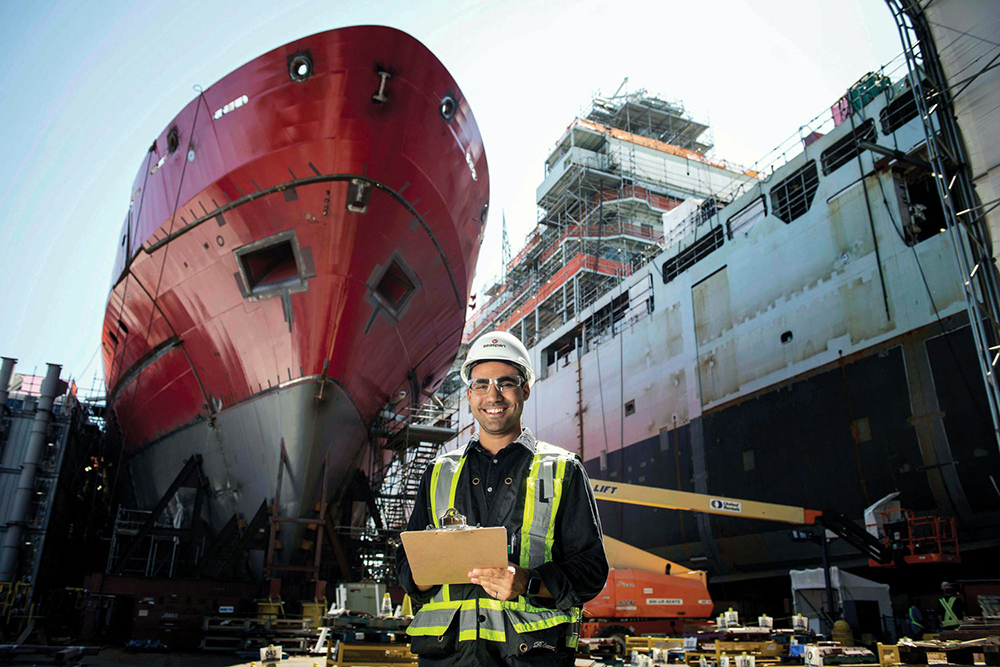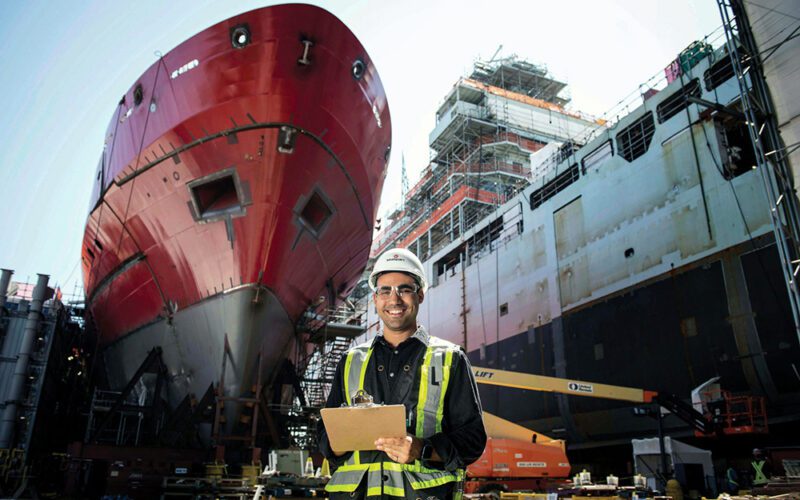
Under Canada’s National Shipbuilding Strategy (NSS), Seaspan Shipyards has contributed more than $5.7 billion to Canada’s GDP through its shipbuilding and repair, refit, and maintenance activities, according to a recent socio-economic study conducted by Deloitte Canada.
Additionally, Seaspan is expected to contribute an additional $20.7 billion to Canada’s GDP through 2035, according to the study, which highlights the economic benefits of rebuilding the shipbuilding industry in Canada since the NSS’s introduction in June, 2010.
The results of the study were released Nov. 23 by British Columbia-based Seaspan.
The National Shipbuilding Strategy is a Government of Canada program operated by the Department of Public Works and Government Services. It was developed in an effort to renew the fleets of the Royal Canadian Navy (RCN) and the Canadian Coast Guard (CCG).
Upon its founding in 2010, the program was charged with selecting Canadian shipyards capable of rebuilding the fleets of the RCN and the CCG through two large packages of work (a combat ship package and a non-combat ship package), originally valued at about $38 billion but now in excess of $100 billion.
Another package of work for smaller vessels was separate but part of the overall strategy.
Since the inception of the National Shipbuilding Strategy, Seaspan has spent over $3.4 billion on shipbuilding operations, modernization of shipyard infrastructure, integration of advanced shipbuilding technologies, and development of skilled workers. Additionally, $1.4B has been spent on maintenance, repair and refit work across the 2012-2022 timeline.
The report indicates that in addition to the GDP contributions made by Seaspan over the NSS’s first 12 years, Seaspan’s shipbuilding and ship repair activities have also been a boon for job creation in the maritime industry.
More than 7,000 jobs are now being created or sustained annually through Seaspan’s activities. This figure is expected to grow to nearly 11,000 jobs annually by 2035, according to Deloitte Canada.
“Across the country, Seaspan has now awarded $2.4 billion in contracts under our NSS shipbuilding activities alone,” the company said in a statement. “More than 700 Canadian companies have been involved in building ships for Canada, with nearly 500 being small and medium-sized businesses, accounting for 63% of NSS-related contract values.”
Seaspan Shipyards CEO John McCarthy said that as Canada’s partner under the NSS, Seaspan is “transforming shipbuilding and marine industries through innovation, partnerships and developing world-class talent.”
“The economic contributions of this work are evident locally, regionally and across the country,” McCarthy said. “Over the next year alone, we will be adding hundreds of people to our team to help us deliver on our promise of ships built in Canada, by Canadians.”
“As we continue to invest in our people, facilities and drive improvements in how we design, build, and repair ships,” he added, “Seaspan will remain a significant contributor to the Canadian economy for decades to come and a preferred employer for those looking to work in the maritime industry in British Columbia.”
Under the NSS, Seaspan is currently building the federal non-combat fleet of vessels for the Royal Canadian Navy and Canadian Coast Guard (CCG).
In addition to the three Offshore Fisheries Science Vessels which have already been delivered to the CCG, Seaspan’s book of work includes two Joint Support Ships and an Offshore Oceanographic Science Vessel which are currently under construction. It also includes one Polar Icebreaker, the flagship of the CCG’s fleet, and 16 Multi-Purpose Vessels. The Polar Icebreaker and the lead ship of the MPVs are both in design.
Seaspan also provides repair, refit, and conversion work for a range of government and commercial clients.
“Seaspan is re-building an industry, building complex ships by Canadians for Canadians, is developing a pipeline of maritime talent, and is creating an economic ripple effect felt from coast to coast to coast,” the company said.
Seaspan Shipyards, a division of Seaspan ULC, has workforce of about 3,900 people in North Vancouver and Victoria, B.C.
The full 32-page socio-economic contribution study is available to read and download on Seaspan’s website: https://www.seaspan.com/economic-impact/.

